六年级上英语易错句
六年级上册英语易错题
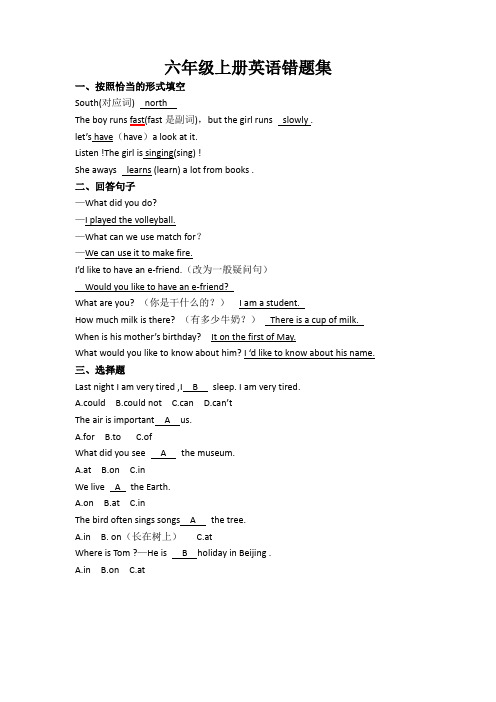
六年级上册英语错题集一、按照恰当的形式填空South(对应词) northThe boy runs fast(fast是副词),but the girl runs slowly .let’s have(have)a look at it.Listen !The girl is singing(sing) !She aways learns (learn) a lot from books .二、回答句子—What did you do?—I played the volleyball.—What can we use match for?—We can use it to make fire.I’d like to have an e-friend.(改为一般疑问句)Would you like to have an e-friend?What are you? (你是干什么的?)I am a student.How much milk is there? (有多少牛奶?)There is a cup of milk. When is his mother’s birthday? It on the first of May.What would you like to know about him? I ‘d like to know about his name.三、选择题Last night I am very tired ,I B sleep. I am very tired.A.couldB.could notC.canD.can’tThe air is important A us.A.forB.toC.ofWhat did you see A the museum.A.atB.onC.inWe live A the Earth.A.onB.atC.inThe bird often sings songs A the tree.A.inB. on(长在树上)C.atWhere is Tom ?—He is B holiday in Beijing .A.inB.onC.at。
译林版英语六年级上册单元知识易错点整理
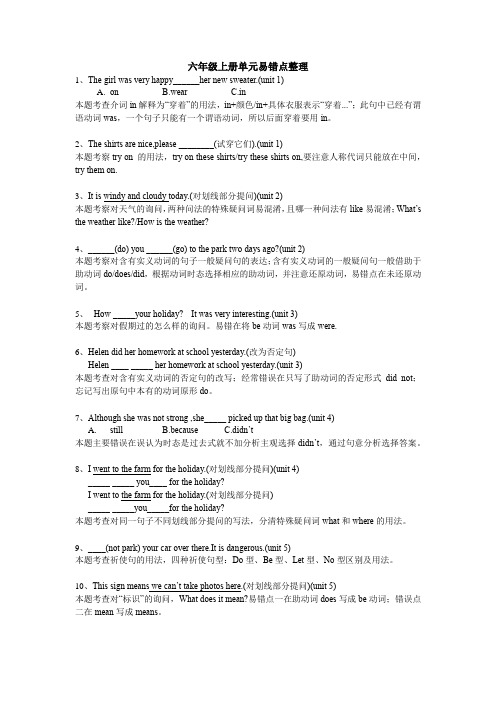
六年级上册单元易错点整理1、The girl was very happy______her new sweater.(unit 1)A.onB.wearC.in本题考查介词in解释为“穿着”的用法,in+颜色/in+具体衣服表示“穿着...”;此句中已经有谓语动词was,一个句子只能有一个谓语动词,所以后面穿着要用in。
2、The shirts are nice,please ________(试穿它们).(unit 1)本题考察try on 的用法,try on these shirts/try these shirts on,要注意人称代词只能放在中间,try them on.3、It is windy and cloudy today.(对划线部分提问)(unit 2)本题考察对天气的询问,两种问法的特殊疑问词易混淆,且哪一种问法有like易混淆;What’s the weather like?/How is the weather?4、______(do) you ______(go) to the park two days ago?(unit 2)本题考察对含有实义动词的句子一般疑问句的表达;含有实义动词的一般疑问句一般借助于助动词do/does/did,根据动词时态选择相应的助动词,并注意还原动词,易错点在未还原动词。
5、--How _____your holiday? --It was very interesting.(unit 3)本题考察对假期过的怎么样的询问。
易错在将be动词was写成were.6、Helen did her homework at school yesterday.(改为否定句)Helen ____ _____ her homework at school yesterday.(unit 3)本题考查对含有实义动词的否定句的改写;经常错误在只写了助动词的否定形式did not;忘记写出原句中本有的动词原形do。
小学英语六年级上册易错题时态三单ing

时态易错题一、一般现在时:主语+动词原形或动词三单+多次发生的时间(如频度副词always usually often sometimes on Mondays) 动词原形变三单规则:1.一般情况下直接加s。
2.以s/x/ch/sh/o结尾的动词加es。
3.以元音字母+y结尾的动词直接加s。
(元音字母有a/e/i/o/u)以辅音字母+y结尾的动词变y为i加es。
4.以f/fe结尾的动词变f/fe为v加es。
(仅了解)5.特殊:have的三单是has二、现在进行时:主语+be+动词ing+表示现在的时间(如now,look,listen)动词原形变动词ing的规则:1、一般情况直接加ing。
2、以不发音的e结尾的去e加ing。
3、双写最后一个辅音字母加ing:run-running,swim-swimming,shop-shopping,get-getting,sit-sitting,cut-cutting,win-winning三、一般将来时:主语+be going to +动词原形+将来时间主语+will+动词原形+将来时间(如 tomorrow /this morning/this... /next week/next.../one day )一、写出下列单词的第三人称单数及动词ing形式。
1、buy _______ ________2、clean_______ ________3、help_______ ________4、find_______ ________5、pass_______ ________6、try_______ ________7、get_______ ________8、come_______ ________9、fly_______ ________10、love_______ ________11、eat_______ ________12、pack_______ ________13、wait_______ ________14、speak_______ ________15、finish_______ ________16、wash_______ ________17、watch_______ ________18、do_______ ________ 19、read_______ ________20、play_______ ________21、sing_______ ________22、dance_______ ________23、draw_______ ________24、cook _______ ________25、swim_______ ________26、learn_______ ________27、study_______ ________28、want _______ ________29、send_______ ________30、live_______ ________31、have_______ ________32、take_______ ________33、make_______ ________34、start_______ ________35、late_______ ________36、need_______ ________37、win_______ ________38、pick_______ ________39、meet_______ ________40、plant_______ ________41、look_______ ________42、climb_______ ________43、jump_______ ________44、drink_______ ________45、sleep_______ ________46、listen_______ ________47、talk_______ ________48、like_______ ________49、say_______ ________50、teach_______ ________51、catch_______ ________52、see_______ ________53、ask_______ ________54、give_______ ________55、tell_______ ________56、wear_______ ________57、visit_______ ________58、join_______ ________ 59、share_______ ________60、use_______ ________61、type_______ ________62、chase_______ ________63、hurt_______ ________64、hear_______ ________65、worry_______ ________一般现在时一、用单词的正确形式填空:1.Mike _________ (do) his homework every day.2.He _________ (like) swimming.3.We like ________ (play) basketball after class.4.I like singing. I often _________(listen) to the music in the evening.5.My grandma_________(watch) TV every day.二.单选1. ____Alice often play the piano?No, she _____.A.Do; doB. Does; doesC. Does; doesn’t2. ___ your pen pal _____ in Beijing?A. Do; liveB. Do; livesC. Does; live3. Tom and Mike_________very excited, they will take a trip.A. isB. areC. am4. I like ________ very much. What about you?A. danceB. dancedC. dancing5. Bill and I ___ good friends.A. isB. areC. am6. Sandy often ___ his homework on Sundays .A. doB. doesC. did7. What do you usually do on the weekend?I __________.A. went swimmingB. go swimmingC. visited grandparents8. What do you usually do on your holiday?A. saw elephantsB. sing and danceC.took pictures9. I ____ a student. I go to school ____bus every day.A. is; byB. am; onC. am; by现在进行时一、填空。
期末易错点总结(讲义)译林版英语六年级上册
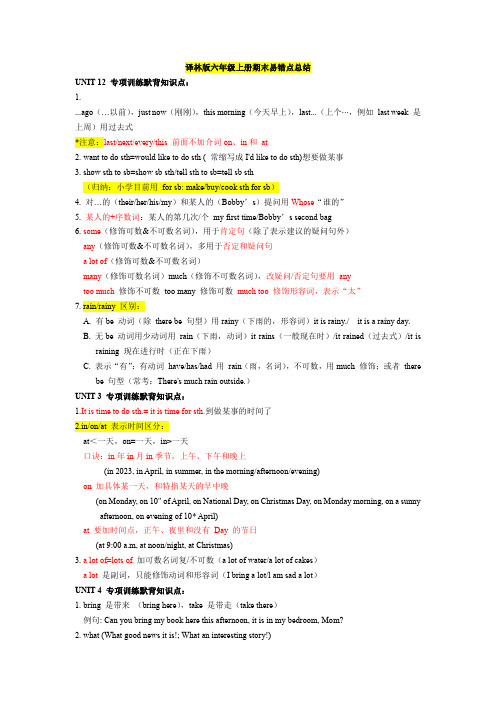
译林版六年级上册期末易错点总结UNIT 12 专项训练默背知识点:1....ago(…以前),just now(刚刚),this morning(今天早上),last...(上个⋯,例如last week 是上周)用过去式*注意:last/next/every/this 前面不加介词on、in和at2. want to do sth=would like to do sth ( 常缩写成I'd like to do sth)想要做某事3. show sth to sb=show sb sth/tell sth to sb=tell sb sth(归纳:小学目前用for sb: make/buy/cook sth for sb)4. 对…的(their/her/his/my)和某人的(Bobby’s)提问用Whose“谁的”5. 某人的+序数词:某人的第几次/个my first time/Bobby’s second bag6. some(修饰可数&不可数名词),用于肯定句(除了表示建议的疑问句外)any(修饰可数&不可数名词),多用于否定和疑问句a lot of(修饰可数&不可数名词)many(修饰可数名词)much(修饰不可数名词),改疑问/否定句要用anytoo much修饰不可数too many 修饰可数much too 修饰形容词,表示“太”7. rain/rainy 区别:A. 有be 动词(除there be 句型)用rainy(下雨的,形容词)it is rainy./ it is a rainy day.B. 无be 动词用少动词用rain(下雨,动词)it rains(一般现在时)/it rained(过去式)/it israining 现在进行时(正在下雨)C. 表示“有”:有动词have/has/had 用rain(雨,名词),不可数,用much 修饰;或者therebe 句型(常考:There's much rain outside.)UNIT 3 专项训练默背知识点:1.It is time to do sth.= it is time for sth.到做某事的时间了2.in/on/at 表示时间区分:at<一天,on=一天,in>一天口诀:in年in月in季节,上午、下午和晚上(in 2023, in April, in summer, in the morning/afternoon/evening)on 加具体某一天,和特指某天的早中晚(on Monday, on 10" of April, on National Day, on Christmas Day, on Monday morning, on a sunny afternoon, on evening of 10* April)at 要加时间点,正午、夜里和没有Day 的节日(at 9:00 a.m, at noon/night, at Christmas)3. a lot of=lots of加可数名词复/不可数(a lot of water/a lot of cakes)a lot 是副词,只能修饰动词和形容词(I bring a lot/l am sad a lot)UNIT 4 专项训练默背知识点:1. bring 是带来(bring here),take 是带走(take there)例句: Can you bring my book here this afternoon, it is in my bedroom, Mom?2. what (What good news it is!; What an interesting story!)3. with 就近原则:Look! Liu Tao(真正的主语)with his parents is picking apples on the farm.4. use sth to do sth, use的形容词useful 有用的,useless 无用的例句: We use new words to make a sentence to learn English.We use water to clean things every day.UNIT 56 专项训练默背知识点:1. 重点单词和词组:餐馆restaurant 扔垃圾litter走路回家walk home 把教室弄很脏make the classroom very dirty外出游玩go on an outing乘地铁上学take the metro to school例句: Billy slipped on the banana skin and fell.或者:Billy slips on the banana skin and falls.The meat/bread smells nice, I want to eat it.2. 不可数名词:smoke/air/energy,不可数名词做三单例:What makes the air dirty? Smoke(真正的主语)from cars and factories makes the air dirty.3. 常用加doing sth:like doing/Look! sb is doing...例: It's nine o'clock, the students are doing morning exercises.常用do sth: make sb do sth; let's=let us do sth; can/should/ must/please do sth常用加to do sth: what/how/why 等疑问词+to do sthUNIT 7 专项训练默背知识点:1. 用a还是用anan 字母题:口诀1.Mr Li has one fox. 李先生有一个狐狸。
小学六年级英语易错题100道整理附参考答案(精品)
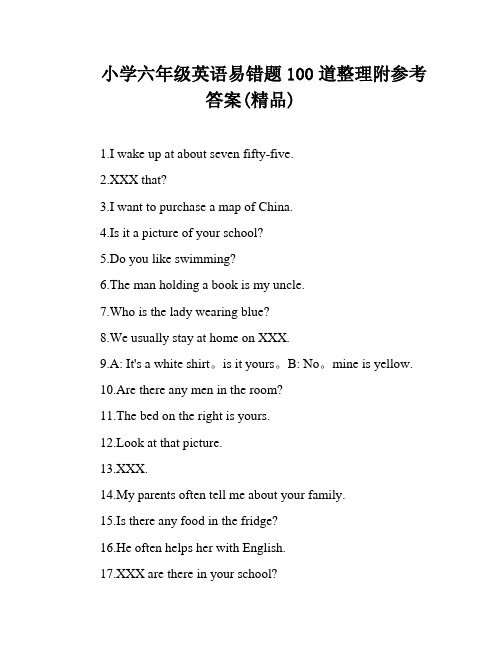
小学六年级英语易错题100道整理附参考答案(精品)1.I wake up at about seven fifty-five.2.XXX that?3.I want to purchase a map of China.4.Is it a picture of your school?5.Do you like swimming?6.The man holding a book is my uncle.7.Who is the lady wearing blue?8.We usually stay at home on XXX.9.A: It's a white shirt。
is it yours。
B: No。
mine is yellow.10.Are there any men in the room?11.The bed on the right is yours.12.Look at that picture.13.XXX.14.My parents often tell me about your family.15.Is there any food in the fridge?16.He often helps her with English.17.XXX are there in your school?18."Are you twins?" "Yes。
we are twins."19.David goes to school on his bike every day.20.Are you。
he。
and I in the same class?21.There's a "u" in the word "use".22."XXX?" "4".23.That's his bus.24.--"Thank you very much."---"That's all right."25.It'XXX.26.May has got a Chinese book.27.This is Mr。
人教PEP版小学英语六年级上册Unit 3 重点易错汇总

冠词 a。 4.短语的中文意思记忆有误,comic book 表示连环画册。
5.短语的中文意思记忆有误,today 表示“今天”, tomorrow 表示“明天”。 6.英语单词混淆,
evening 表示“晚上” ,tonight 表示“今夜”。 7.“不得不”是强调客观上的“必须”用 have,而
space travel.
“这是一部关于太空旅行的电影”“about”是
“和…….一起”,所以选择 B. “9、关“于去”书的店意”思的,英所文以“选go择 Bto.
the bookstore” 乘坐地铁的英文“by subway”,所以
选10择、lCo.ts of= a lot of 许多,选择 B,其他选项形式错误。
have”,本题答案是 B.
4 、 根 据 句 子 中 的 主 语 “ 、youW”h选en“择 什系 么动 词时 “候ar”e” 、, Wh根o“据谁所”给根句 据子 W”hen
5、 you
aWrehaytou “goi什ngan么toamr”tolrersoswo?n”? 确定这是一个将来时态的句子,所以选择“going
to
选择“When”意为“你 明天打算什么时候去?”所以选择 B. 6、next week“下周”
用在句末,前面不用任何介词,所以选择 C.
7、 I’m going to the zoo
my cousin Jack.“我将要和我的表兄弟杰克一起去动物 园”“with”是
8、This is a movie
B. is
2. (C)- Is he going to t.ake a bus to school?
A.Yes, he is.
B. Yes, she is. 3.(A)
人教pep小学英语六年级上册易错题 句子填空
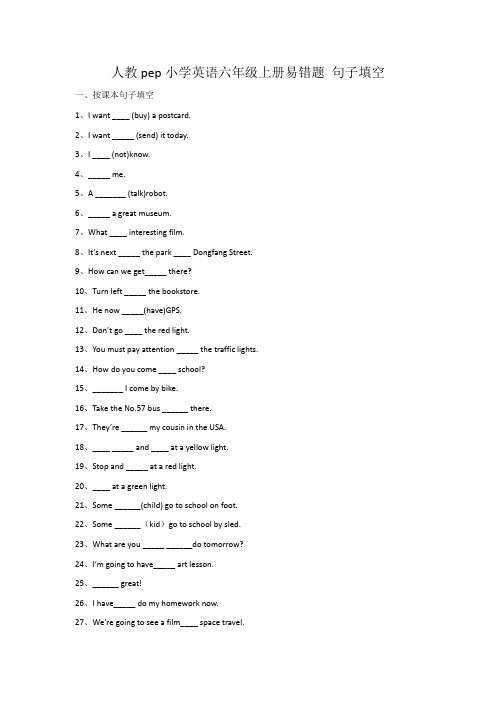
人教pep小学英语六年级上册易错题句子填空一、按课本句子填空1、I want ____ (buy) a postcard.2、I want _____ (send) it today.3、I ____ (not)know.4、_____ me.5、A _______ (talk)robot.6、_____ a great museum.7、What ____ interesting film.8、It’s next _____ the park ____ Dongfang Street.9、How can we get_____ there?10、Turn left _____ the bookstore.11、He now _____(have)GPS.12、Don’t go ____ the red light.13、You must pay attention _____ the traffic lights.14、How do you come ____ school?15、_______ I come by bike.16、Take the No.57 bus ______ there.17、They’re ______ my cousin in the USA.18、____ _____ and ____ at a yellow light.19、Stop and _____ at a red light.20、____ at a green light.21、Some ______(child) go to school on foot.22、Some ______(kid)go to school by sled.23、What are you _____ ______do tomorrow?24、I’m going to have_____ art lesson.25、______ great!26、I have_____ do my homework now.27、We’re going to see a film____ space travel.28、Why not ____(go) on Tuesday?29、My family ______(be)going to get together.30、My aunt is going to _____ (make) mooncakes.31、He lives _____ a farm.32、He _______ (also/too) likes singing.33、You like singing,______(also/too).34、I’m going to teach____(he)the Chinese song.35、What are you ______?36、I’m writing _____email to my new pen pal .37、There ____ (be)a dance class on Sunday.38、He works ____ sea.39、She can _____(type) very quickly.40、What’s this cartoon ______.41、They’re afraid _____him.42、The cat is angry _____ them.43、Because the mice ____(be) bad.44、Maybe our cat is_______ a mouse now.45、What’s wrong _____ you?46、Don’t ____ sad.47、Everyone _____(be)happy.48、Can you help ______.(I)49、There _____(be) a pet hospital in my city.50、Is this _____(you) bike?51、They will_____(go) by bus.52、The bus is _______.(come)53、You must drive _______.(slow)54、Mike is ________(going) to see a film.55、Are they going by bus ______(and) on foot?56、Two students like _______(play) football.57、My aunt is a _______.(science)58、He often goes to other _________.(country)59、He _______(have) a very healthy life.60、Sarah likes ______(use) computers.61、______(be) your father here today?62、She wants _____(work) in an office.63、______(do)he live on the South Island?64、He likes ______(read)stories.65、What are your ______(hobby)?66、Two students like ______(dance).67、He lives in Australia,but he _____(study)Chinese.68、What _____(a) interesting film.69、They are_______(talk) about a sport meet.70、They are from ______( I ) cousin in the USA.71、I have lots of comic _______(books).72、I’m going to __________(visit)my grandparents.73、It’s next ______(to/of) the bookstore.74、Now we ______(are/do) in front of Tian’anmen.75、Let’s eat ______(first/one).76、Can you make sentences with ____(this/these) words.77、Wu Yifan _______(but/and) his friends want to eat some pizza.78、_____ can I get there?(where/how/who /what)79、That’s _____good exercise.(an/ / /a/one)80、How do we _____?(get there/ gt to there)81、I have _______comic books about space.(lots of/ a lot/a lots of)。
六年级英语上册《易错知识点》,考试一定要注意

六年级英语上册《易错知识点》,考试一定要注意六年级英语上册《易错知识点》名词类1.这些女老师们在干什么?[误]What are the woman teachers doing? [正]What are the women teachers doing? [析]在英语中,当一名词作定语修饰另一名词(单或复数形式)时,作定语的名词一般要用其单数形式;但当man,woman作定语修饰可数名词复数形式时,要用其复数形式men, women.2.房间里有多少人?[误]How many peoples are there in the room?[正]How many people are there in the room?[析]people作“人人们”解时,是个集合名词,单复数同形。
3. 我想为我儿子买两瓶牛奶。
[误]I want to buy two bottle of milk for my son.[正]I want to buy two bottles of milk for my son.[析]表示不可数名词的数量时,常用“a / an或数词+表量的可数名词+ of + 不可数名词”这一结构,其中当数词大于1时,表量的可数名词要用其复数形式。
动词类1.你妹妹通常什么时候去上学?[误]What time does your sister usually goes to school[正]What time does your sister usually go to school?[析]借助助动词do(或does)构成疑问句或否定句时,句中的谓语动词用其原形。
2. 琳达晚上经常做作业,但今晚她在看电视。
[误]Linda often do her homework in the evening, but this evening she watching TV. [正] Linda often does her homework in the evening, but this evening she is watching TV.[析]一般现在时表示经常的或习惯性的动作,常和often, usually, sometimes 等时间状语连用。
英语六年级上册期末专项攻略:完形填空(易错专项)人教PEP版
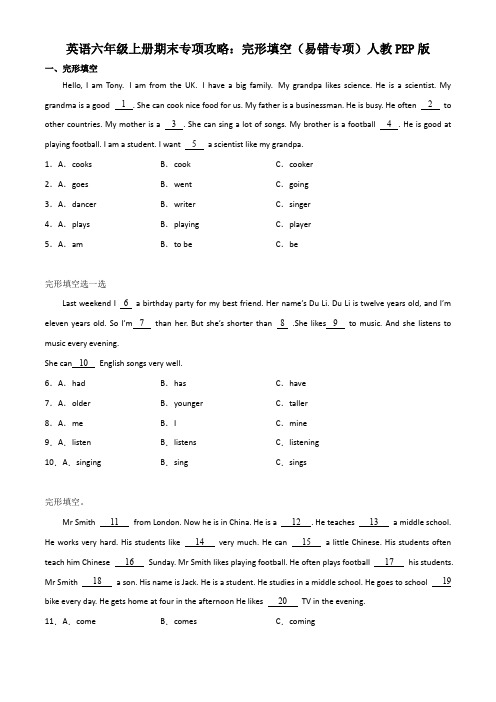
英语六年级上册期末专项攻略:完形填空(易错专项)人教PEP版一、完形填空Hello, I am Tony.I am from the UK.I have a big family.My grandpa likes science. He is a scientist. My12.A.teacher B.worker C.farmer13.A.on B.in C.to14.A.he B.him C.her15.A.say B.talk C.speak16.A.at B.of C.on17.A.with B.for C.to18.A.has B.have C.there is19.A.on B.by C.in20.A.seeing B.looking C.watchingA dog has large piece of meat in his mouth. When he is 21 on a small bridge, he looks down and 22 himself in the water. He thinks it is another dog. That dog has also a large piece of meat in his mouth. He says to himself, “I want to 23 his meat. Then I can have 24 pieces of meat. He opens his mouth to bark (吠叫) the dog in the water, and his meat falls into 25 .21.A.walk B.walks C.walking22.A.see B.sees C.seeing23.A.get B.gets C.getting24.A.one B.two C.three25.A.bridge B.mouth C.water完形填空。
英语六年级上册期末专项攻略:完形填空(易错专项)译林版(三起)
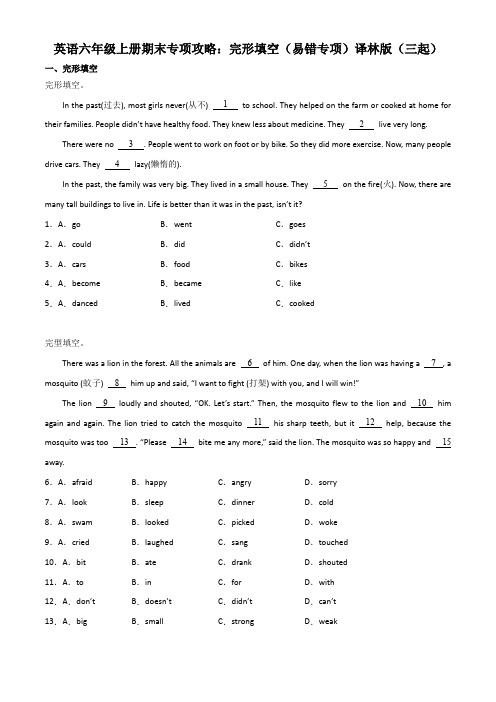
英语六年级上册期末专项攻略:完形填空(易错专项)译林版(三起)一、完形填空完形填空。
In the past(过去), most girls never(从不) 1 to school. They helped on the farm or cooked at home for their families. People didn’t have healthy food. They knew less about medicine. They 2 live very long.There were no 3 . People went to work on foot or by bike. So they did more exercise. Now, many people drive cars. They 4 lazy(懒惰的).In the past, the family was very big. They lived in a small house. They 5 on the fire(火). Now, there are many tall buildings to live in. Life is better than it was in the past, isn’t it?1.A.go B.went C.goes2.A.could B.did C.didn’t3.A.cars B.food C.bikes4.A.become B.became C.like5.A.danced B.lived C.cooked完型填空。
There was a lion in the forest. All the animals are 6 of him. One day, when the lion was having a 7 , a mosquito (蚊子) 8 him up and said, “I want to fight (打架) with you, and I will win!”The lion 9 loudly and shouted, “OK. Let’s start.” Then, the mosquito flew to the lion and 10 him again and again. The lion tried to catch the mosquito 11 his sharp teeth, but it 12 help, because the mosquito was too 13 . “Please 14 bite me any more,” said the lion. The mosquito was so happy and 15 away.6.A.afraid B.happy C.angry D.sorry7.A.look B.sleep C.dinner D.cold8.A.swam B.looked C.picked D.woke9.A.cried B.laughed C.sang D.touched10.A.bit B.ate C.drank D.shouted11.A.to B.in C.for D.with12.A.don’t B.doesn’t C.didn’t D.can’t13.A.big B.small C.strong D.weak14.A.not B.don’t C.doesn’t D.no15.A.flew B.walked C.ran D.swamDo you know Peter Rabbit? He is every child’s favourite 16 in the UK. 17 of the UK, Beatrix Potter, first wrote about him in 1902 and it caught people's eyes at once. Peter always wears a blue jacket. He is a bit naughty (淘气的) and likes to play tricks and makes people 18 . He often runs into Mr McGregor’s garden to eat his 19 . Mr McGregor 20 like Peter, but he can never catch him. He can only watch over his vegetable garden.But then, Mr McGregor gets a new 21 a woman named Bea. She is beautiful and kind, and lives 22 to Mr McGregor’s garden. She loves 23 very much and she always smiles when she sees Peter Rabbit. Mr McGregor really likes the new neighbor. So he pretends to be nice to the rabbit too. But Peter sees through him and makes a lot of trouble for him. 24 , Mr McGregor can’t stand (忍受) it any more.Do you want to know more about them? You can find out in the cartoon movie Peter Rabbit. It came out on 25 of March in China.16.A.boy B.rabbit C.carrot17.A.Singer B.Dancer C.Writer18.A.angry B.hungry C.thirsty19.A.vegetables B.oranges C.apples20.A.don’t B.doesn’t C.isn’t21.A.teacher B.neighbor C.wife22.A.beside B.behind C.next23.A.rabbits B.vegetables C.gardens24.A.First B.At last C.But25.A.second B.two C.the second完形填空。
【易错题专项三 连词成句】专项 六年级英语上册 外研版(三起)含答案

三连词成句(易错题)一、连词成句。
1. and, it's, beautiful, long(. )_____________________________________2. million, has, more, five, it, got, than, people(. )_____________________________________3. is, how, the, Great, Wall, long(?)_____________________________________4. something, about, you, can, tell,New York, me(?)_____________________________________5. twenty, it's, than, more, kilometres, long, thousand(. ) _____________________________________6. me, about, the Huangshan Mountain, tell, more(. )_____________________________________7. map, the US, big, of, a, what(!)_____________________________________8. is, the ,West, Lake, where(?)_____________________________________9. China, and, country, a, too, is, big(. )_____________________________________10. kilometres, more, it’s, long, thousand, twenty, than(. )11.postcards, from,,China , these , are(.)_____________________________________12.there, dancing ,in, is, Chinese, Chinatown (.)_____________________________________13.let’s, to, go, the , Huangshan, Mountain , now (.)_____________________________________14.there, lots, of, in , are, China, lakes, beautiful (.)_____________________________________15.are ,of ,computers, lots, in, there ,classroom ,the (.)_____________________________________ 16.the, bout, animal, me, tell, more(.)_____________________________________ 17.Is, how, big, Shanghai(?)_____________________________________ 18.Laura, visiting, is, the, US(.)_____________________________________ 19.Are, these, great, postcards(!)_____________________________________ 20.the, is , Palace , Museum , this(.)_____________________________________ 21.Sending, I, my, China, family, in, an, email, am, to(.)22.This, do, what, country, speak, they, in(?)_____________________________________ 23.the, China, capital, city, Beijing, is ,of(.)_____________________________________24.Is, Tian'anmen, Square, this, Beijing, in(.)_____________________________________25.is, this, map, of, country, a, our(.)_____________________________________ 26.Million, has, more, eight, it, got , than, people(.)_____________________________________ 27.something, New, you, about, tell, can, me, York(?)_____________________________________ 28.Cousin, with, in, York, his, he's, New, Simon(,.)_____________________________________ 29.Long, It, more ,is, than, kilometres, thousand, ten(.)_____________________________________ 30.Postcards, great, these, are(.)_____________________________________参考答案1.It's long and beautiful.2.It has got more than five million people.3.How long is the Great Wall?4.Can you tell me something about New York?5.It's more than twenty thousand kilometres long.6. Tell me more about the Huangshan Mountain.7. What a big map of the US!8. Where is the West Lake?9. And China is a big country too.10. It’s more than twenty thousand kilometres long.11.These postcards are from China.12.There is Chinese dancing in Chinatown.13.Let's go to the Huangshan Mountain now.14.There are lots of beautiful lakes in China.15.There are lots of computers in the classroom. 16.Tell me more about the animal.17.How big is Shanghai?18.Laura is visiting the US.19.These are great postcards!20.This is the Palace Museum.21.I am sending an email to my family in China.22.What do they speak in this country ?23.Beijing is the capital city of China.24.This is Tian'anmen Square in Beijing.25.This is a map of our country.26.It has got more than eight million people.27.Can you tell me something about New York?28.He's in New York with his cousin,Simon.29.It's more than ten thousand kilometres long.30.These are great postcards.。
六年级上册英语六个单元重点单词重点句子和易错题

六年级上册英语六个单元重点单词重点句子和易错题六年级上册英语单词及句子复习Unit1第一单元单词:Science museum科学博物馆post office邮局bookstore书店cinema电影院hospital医院crossing十字路口turn left向左转go straight直走turn right向右转重点句子:1、--Where is the museum shop?博物馆的商店在哪儿?--It`s near the door在大门附近2、--How can we get there?我们怎么到那儿?--Turn left at the bookstore到书店左转Unit2第二单元单词:on foot走路by bus乘公共汽车by taxi乘出租车by plane乘飞机by subway乘地铁by ship乘船by train乘火车slow down减速stop停下wait等go走重点句子:1、--How do you come to school?你怎么来学校的?--Usually,I come on foot通常我走路来2、In the USA people on bikes must wear one.在美国骑自行车的人必须戴头盔。
3、Don’t go at the red light!别闯红灯。
4、I must pay attention to the traffic lights我必须注意交通信号灯Unit3第三单元单词:visit my grandparents拜访我的外祖父母see a film看电影take a trip远行go to the supermarket 去超市dictionary词典comic book连环画书word book单词书postcard明信片重点句子:1、--What are you going to do tomorrow?你明天打算做什么?--I’m going to have an artlesson.我要上美术课2、We’re going to draw some pictures in Renmin Park.我要到人民公园去画画3、--Where are you going?你们打算去哪儿?--We`re going to the cinema我们打算去电影院4、When are you going?你们什么时候去?Unit4第四单元单词:dancing跳舞singing唱歌reading stories看故事书playing football踢足球doing kung fu打功夫cooks Chinese food做中国菜studies Chinese学习汉语does word puzzles猜字谜goes hiking远足重点句子:1、--What are Peter`s hobbies?彼得有什么爱好?--He likes reading stories他喜欢读故事2、--Does he live in Sydney?他住在悉尼吗?--No, he doesn`t不,他没有3、--Does he like doing word puzzles and goinghiking?他喜欢猜字谜和远足吗?--Yes,he does是的,他喜欢Unit5第五单元四会单词:factory worker工厂工人postman邮递员businessman生意人police officer警察fisherman渔民scientist科学家pilot飞行员coach教练重点句子:1、--What does he do?他是做什么的?--He isa businessman.他是商人2、--Where does he work?他在哪儿工作?--He works at sea.他在海上工作。
人教版pep小学英语六年级上册易错题时态、三单、ing

人教版pep小学英语六年级上册易错题时态、三单、ingPEP小学英语六年级上册易错题时态、三单、ing时态易错题一、一般现在时:在描述多次发生的动作时,使用主语+动词原形或动词的第三人称单数形式+频度副词(如always。
usually。
often。
sometimes。
on Mondays)+时间。
动词的第三人称单数形式的变化规则如下:1.一般情况下,直接在动词后面加上“s”。
2.对于以“s”、“x”、“ch”、“sh”、“o”结尾的动词,需要在其后加上“es”。
3.对于以元音字母(a、e、i、o、u)结尾的动词,直接在其后加上“s”。
4.对于以辅音字母+y结尾的动词,需要将“y”变为“i”,再加上“es”。
5.对于以“f”或“fe”结尾的动词,需要将其变为“v”,再加上“es”(仅了解)。
6.特殊情况:have的第三人称单数形式为has。
二、现在进行时:在描述正在进行的动作时,使用主语+be动词+动词的ing 形式+表示现在的时间(如now。
look。
listen)。
动词的ing 形式的变化规则如下:1.一般情况下,直接在动词后面加上“ing”。
2.对于以不发音的“e”结尾的动词,需要去掉“e”,再加上“ing”。
3.对于以双写的最后一个辅音字母结尾的动词,需要将其改为单写,再加上“ing”(如run-running,swim-swimming,shop-shopping,get-getting,sit-sitting,cut-cutting,win-winning)。
三、一般将来时:在描述将来要发生的动作时,可以使用主语+be going to+动词原形+将来时间或者主语+will+动词原形+将来时间(如tomorrow。
this morning。
this。
next week。
next。
one day)。
练:将下列动词转化为第三人称单数形式和ing形式:1.buy – buys。
XXX2.clean – cleans。
人教版PEP六年级英语上册单元知识重点重难易错训练-Unit 4 I have a pen pal

人教版PEP六年级英语上册Unit 4 I have a pen pal 单元知识重点及重难易错训练一、重点单词:studies学习(第三人称单数形式) puzzle谜 hiking远足二、习惯语搭配:read stories读故事 do kung fu练功夫 fly kites放风筝 play the pipa弹琵琶 play sports进行体育活动 climb mountains爬山 listen tomusic听音乐 sing English songs唱英文歌 on a farm在一个农场里 live in...住在··· write an email to...给···写一封电子邮件 on the playground在运动场上三、惯用表达式:Me too.我也是。
Really?真的吗?四、注意几个单词的变化:hobby(复数形式)—hobbies have to(同义词)—must五、重点语法知识:1、动词变为动名词的规则:动词变为动名词,即是动词加ing。
一般要遵循以下三条规则:(1)一般情况下,在动词的后面直接加ing。
如:play—playing read—reading do—doing go—going(2)以不发音的字母e结尾的动词,要去掉不发音的字母e,再加ing。
如:write—writing ride—riding make—making dance—dancing (3)以单元音加单辅音结尾的重读闭音节,要双写最后一个辅音字母,再加ing。
如:run—running swim—swimming put—putting sit—sitting2、动词变为第三人称单数形式的规则:(1)在一个句子中,如果主语人称既不是你,也不是我,而是另外的一个人,这时的人称叫做第三人称单数。
(2)在第三人称单词的句子中,动词要使用第三人称单词形式。
六年级上册各单元易错题
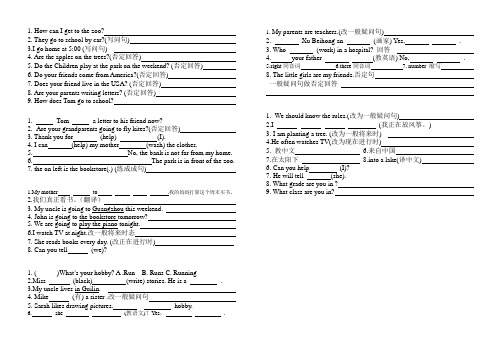
1. How can I get to the zoo?2. They go to school by car?(写问句)3.I go home at 5:00 (写问句)4. Are the apples on the trees?(否定回答)5. Do the Children play at the park on the weekend? (否定回答)6. Do your friends come from America?(否定回答)7. Does your friend live in the USA? (否定回答)8. Are your parents writing letters? (否定回答)9. How does Tom go to school?1.Tom a letter to his friend now?2.Are your grandparents going to fly kites?(否定回答)3. Thank you for (help) (I).4. I can (help) my mother (wash) the clothes.5. No, the bank is not far from my home.6. The park is in front of the zoo.7. the on left is the bookstore(.) (练成成句)1.My mother to .我的妈妈打算这个周末买书。
2.我们真正看书。
(翻译)3. My uncle is going to Guangzhou this weekend.4. John is going to the bookstore tomorrow?5. We are going to play the piano tonight.6.I watch TV at night.改一般将来时态7. She reads books every day. (改正在进行时)8. Can you tell (we)?1. ( )What’s your hobby? A .Run B. Runs C. Running2.Miss (black) (write) stories. He is a .3.My uncle lives in Guilin.4. Mike (有) a sister .改一般疑问句5. Sarah likes drawing pictures. hobby.6. she (教语文)?Yes,. 1. My parents are teachers.(改一般疑问句)2. Xu Beihong an (画家) Yes, .3. Who (work) in a hospital? 回答4. your father (教英语) No, .5.right同音词6.there同音词7. number 缩写8. The little girls are my friends.否定句一般疑问句做否定回答1.We should know the rules.(改为一般疑问句)2.I (我正在放风筝。
人教版六年级上册英语考点及易错知识点

人教版六年级上册英语考点及易错知识点人教版六年级上册英语考点及易错知识点如下:一、名词性物主代词和形容词性物主代词1. 定义:名词性物主代词:一个完整的句子来表明某人的身份,放在句首或句尾。
形容词性物主代词:用来修饰名词,放在名词前。
2. 常见用法:This / That + is + 名词性物主代词(例如:This is my book.)This / That + is + 形容词性物主代词 + 名词(例如:This is her bag.)3. 易错点:学生容易混淆名词性物主代词和形容词性物主代词的用法,应该根据句子的语境和含义来正确使用。
二、介词的用法1. 常见介词:in,on,under,by,near,between等。
2. 易错点:学生常常忘记在表示时间、地点、方向等情境中使用介词。
对于一些相似的介词(如in和on,under和below等)学生容易混淆其用法。
三、动词时态和语态1. 现在进行时:be (am/is/are) + -ing形式。
2. 过去时态:was/were + 动词原形。
3. 将来时态:will + 动词原形。
4. 被动语态:be (am/is/are) + 过去分词。
5. 易错点:学生对于时态和语态的变换规则容易混淆,尤其是过去时态和现在进行时的用法。
在被动语态中,学生容易忘记使用be动词。
四、形容词和副词的比较级和最高级1. 比较级:形容词/副词 + -er形式,如“faster”,“earlier”。
2. 最高级:形容词/副词 + -est形式,如“fastest”,“earliest”。
3. 易错点:学生容易在比较级和最高级的变化规则中出现错误,尤其是对于不规则的形容词和副词。
在使用比较级和最高级时,学生容易忽略其比较的对象。
【小马虎易错题】六年级上册英语讲义Unit1HowcanIgetthere人教PEP
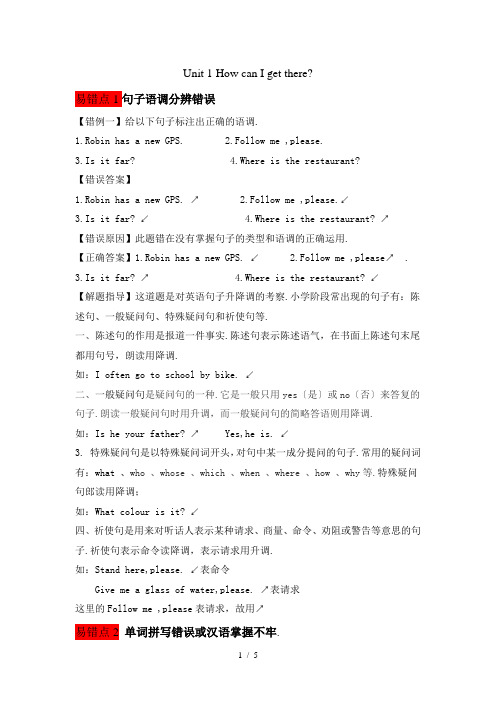
Unit 1 How can I get there?易错点1句子语调分辨错误【错例一】给以下句子标注出正确的语调.1.Robin has a new GPS.2.Follow me ,please.3.Is it far?4.Where is the restaurant?【错误答案】1.Robin has a new GPS. ↗2.Follow me ,please.↙3.Is it far? ↙4.Where is the restaurant? ↗【错误原因】此题错在没有掌握句子的类型和语调的正确运用.【正确答案】1.Robin has a new GPS. ↙ 2.Follow me ,please↗ .3.Is it far? ↗4.Where is the restaurant? ↙【解题指导】这道题是对英语句子升降调的考察.小学阶段常出现的句子有:陈述句、一般疑问句、特殊疑问句和祈使句等.一、陈述句的作用是报道一件事实.陈述句表示陈述语气,在书面上陈述句末尾都用句号,朗读用降调.如:I often go to school by bike. ↙二、一般疑问句是疑问句的一种.它是一般只用yes〔是〕或no〔否〕来答复的句子.朗读一般疑问句时用升调,而一般疑问句的简略答语则用降调.如:Is he your father? ↗ Yes,he is. ↙3. 特殊疑问句是以特殊疑问词开头,对句中某一成分提问的句子.常用的疑问词有:what 、who 、whose 、which 、when 、where 、how 、why等.特殊疑问句郎读用降调;如:What colour is it? ↙四、祈使句是用来对听话人表示某种请求、商量、命令、劝阻或警告等意思的句子.祈使句表示命令读降调,表示请求用升调.如:Stand here,please. ↙表命令Give me a glass of water,please. ↗表请求这里的Follow me ,please表请求,故用↗易错点2 单词拼写错误或汉语掌握不牢.【错例一】英汉互译9.street___________ 10. 医院__________【错误答案】【错误原因】此题错在没有掌握本课的单词的拼写以及汉语意思.【正确答案】【解题指导】这道题是对本节课单词的考察,本节课易混单词如下:1. turn(转弯)------burn〔燃烧〕2. straight〔笔直地〕-----strict〔严厉的〕3.right〔右〕------night〔夜晚〕light〔灯〕4. feature(特点)------nature(自然)5.follow(跟着)-----willow〔柳树〕巧记单词1. hospital=hos+pital联想:doctor医生 nurse护士2. crossing=cross〔横过〕+ing3.left名词right〔右〕4.right同音词write〔写〕5. ask对应词answer〔答复〕6.sir对应词madam女士同义词Mr先生7.interesting同义词fun 8.Italian名词Italy意大利9.bookstore=book〔书〕+store〔商店〕易错点3语法掌握不牢【错例一】( )1. ___ is the post office?It’s near the cinema.【错误答案】B/C【错误原因】此题错在没有掌握特殊疑问词where的用法【解题指导】这道题是考察特殊疑问词where的用法.Where特殊疑问词, 在哪里, 在什么地方,放在句首,就地点提问,答语It’s+介词短语(in/on/near/next to…) 例:Where is your book? It’s on the de sk.【错例二】( )2. can I get to the hospital?【错误答案】A/C【错误原因】此题错在没有掌握特殊疑问词how的用法【正确答案】A【解题指导】这道题考察的特殊疑问词how的用法.句中的特殊疑问词How用来询问动作执行的方式,手段等,译为“如何,怎样〞,这里是询问到达某地的路线.答语可用Turn left/right at the +地点等来答复.例如:How can I get to the cinema?我如何到达电影院?Turn left at the first crossing.在第一个十字路口向左拐.【错例三】’s the bookstore.A.nextB.next toC.near to【错误答案】A/C where when who…?的对话【错误原因】此题错在没有掌介词短语next to 的用法.【正确答案】B【解题指导】这道题考察的是表示方位的介词短语next to的用法.Next形容词紧接着的,下一个;next to 紧挨着,紧邻.例:The museum is next to the shop.博物馆紧挨着商店.易错点4 对话中问句和答语搭配不当.问句和答语连线.( )1.Where is the science museum? A. Turn right at the bookstore.( )2.How can I get to the cinema? B. It’s on the Hongqi Street.( )3.Is it far? C.No.【错误原因】此题错在没有掌握对话知识即问句和答语【正确答案】【解题指导】小1是询问某个地点以及答复的句型.句型结构: Where+be动词(is/are)+主语+其他?答语:主语+be动词(is/are)+介词短语小2是询问如何到达某地的句型.句型结构:How +can +主语+其他?答复:Turn left/right+其他.小3是一般疑问句询问某地是否远?答语用Yes 或No来答复.实战演练一、选择正确的语调标注方法.( )1. A.Robin has a new GPS. ↗ B.Robin has a new GPS. ↙( )2.A.Follow me ,please.↙ B.Follow me ,please.↗( )3.A. Is it far? ↗ B. Is it far? ↙( )4.A.Where is the restaurant? ↗ B.Where is the restaurant? ↙二、根据汉语提示写英语.三、单项选择.( )1. —____ is the science museum? —It’s near the cinema.A.HowB. WhereC. What( ) 2.—____ can I get to the post office? —Go straight and turn left at the hospital.A. WhatB. WhereC. How( )3. I want a film.( )4.Turn left the cinema.A. ofB. onC.at( )5. What interesting film!A. aB. anC. the四、从方框里选择句子把对话补充完整. A: Excuse me.Where is the bookstore?B: 1A: 2B:No, it’s near.You can walk there.A: How can I get there?B: 3A: Thank you.B: 4。
- 1、下载文档前请自行甄别文档内容的完整性,平台不提供额外的编辑、内容补充、找答案等附加服务。
- 2、"仅部分预览"的文档,不可在线预览部分如存在完整性等问题,可反馈申请退款(可完整预览的文档不适用该条件!)。
- 3、如文档侵犯您的权益,请联系客服反馈,我们会尽快为您处理(人工客服工作时间:9:00-18:30)。
1、Slow down and stop!it's a light.
2、I'm having now. What should I do?
You should .
3、My brother next saturday. (旅行)
4、John in China,I in China, to.(live)
5、What does your aunt do?she is a . (邮递员)
6、My father likes on the weekend. (踢足球)
7、He usually goes to school . (坐地铁)
8、My mother is a b . She often goes to other.
9、Does she like ?(爬山)
10、My sister likes . (画画)
11、The black sare. (我们的)
12、The red book is . (他的)
13、This yellow sweater is . (我们的)
14、He likes (做运动)and .(画漫画)
15、My uncle is a . (科学家)
16、Her hobbies are . (听音乐)
17、My aunt is next year . (去北京)
18、He often goes to other . (国家)
19、My mother tomorron. (去爬山)
20、He works in a pet hospital. He is a . (医生)
21、My father works at sea. He is a . (渔民)
22、In the UK ,drivers drive on the side of side of the road.(深呼吸)
In China ,drivers drive on the side of the road.
23、This is Mike 's coat. That sweater is h ,too.
24、My father likes driving planes,So he is a p .
25、I'm thirsay, look,I'm (喝)some tea.
26、Jaly second is the month of a year.
27、The first day of a week is a .
28、It's red light now,we must and .
29、There books are saah . Those pens are , too.
30、He goes to school by .(轮渡)。
